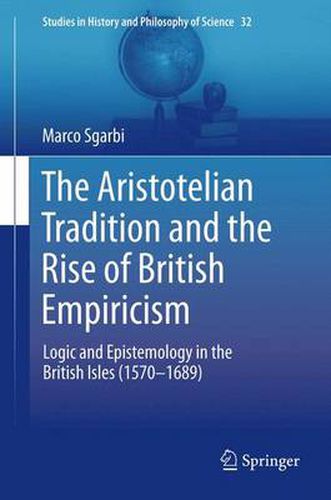The Aristotelian Tradition and the Rise of British Empiricism: Logic and Epistemology in the British Isles (1570-1689)
Marco Sgarbi

The Aristotelian Tradition and the Rise of British Empiricism: Logic and Epistemology in the British Isles (1570-1689)
Marco Sgarbi
This title is printed to order. This book may have been self-published. If so, we cannot guarantee the quality of the content. In the main most books will have gone through the editing process however some may not. We therefore suggest that you be aware of this before ordering this book. If in doubt check either the author or publisher’s details as we are unable to accept any returns unless they are faulty. Please contact us if you have any questions.
Offers an extremely bold, far-reaching, and unsuspected thesis in the history of philosophy: Aristotelianism was a dominant movement of the British philosophical landscape, especially in the field of logic, and it had a long survival. British Aristotelian doctrines were strongly empiricist in nature, both in the theory of knowledge and in scientific method; this character marked and influenced further developments in British philosophy at the end of the century, and eventually gave rise to what we now call British empiricism, which is represented by philosophers such as John Locke, George Berkeley and David Hume. Beyond the apparent and explicit criticism of the old Scholastic and Aristotelian philosophy, which has been very well recognized by the scholarship in the twentieth century and which has contributed to the false notion that early modern philosophy emerged as a reaction to Aristotelianism, the present research examines the continuity, the original developments and the impact of Aristotelian doctrines and terminology in logic and epistemology as the background for the rise of empiricism.Without the Aristotelian tradition, without its doctrines, and without its conceptual elaborations, British empiricism would never have been born. The book emphasizes that philosophy is not defined only by the ‘great names’, but also by minor authors, who determine the intellectual milieu from which the canonical names emerge. It considers every single published work of logic between the middle of the sixteenth and the end of the seventeenth century, being acquainted with a number of surviving manuscripts and being well-informed about the best existing scholarship in the field.
This item is not currently in-stock. It can be ordered online and is expected to ship in 7-14 days
Our stock data is updated periodically, and availability may change throughout the day for in-demand items. Please call the relevant shop for the most current stock information. Prices are subject to change without notice.
Sign in or become a Readings Member to add this title to a wishlist.

